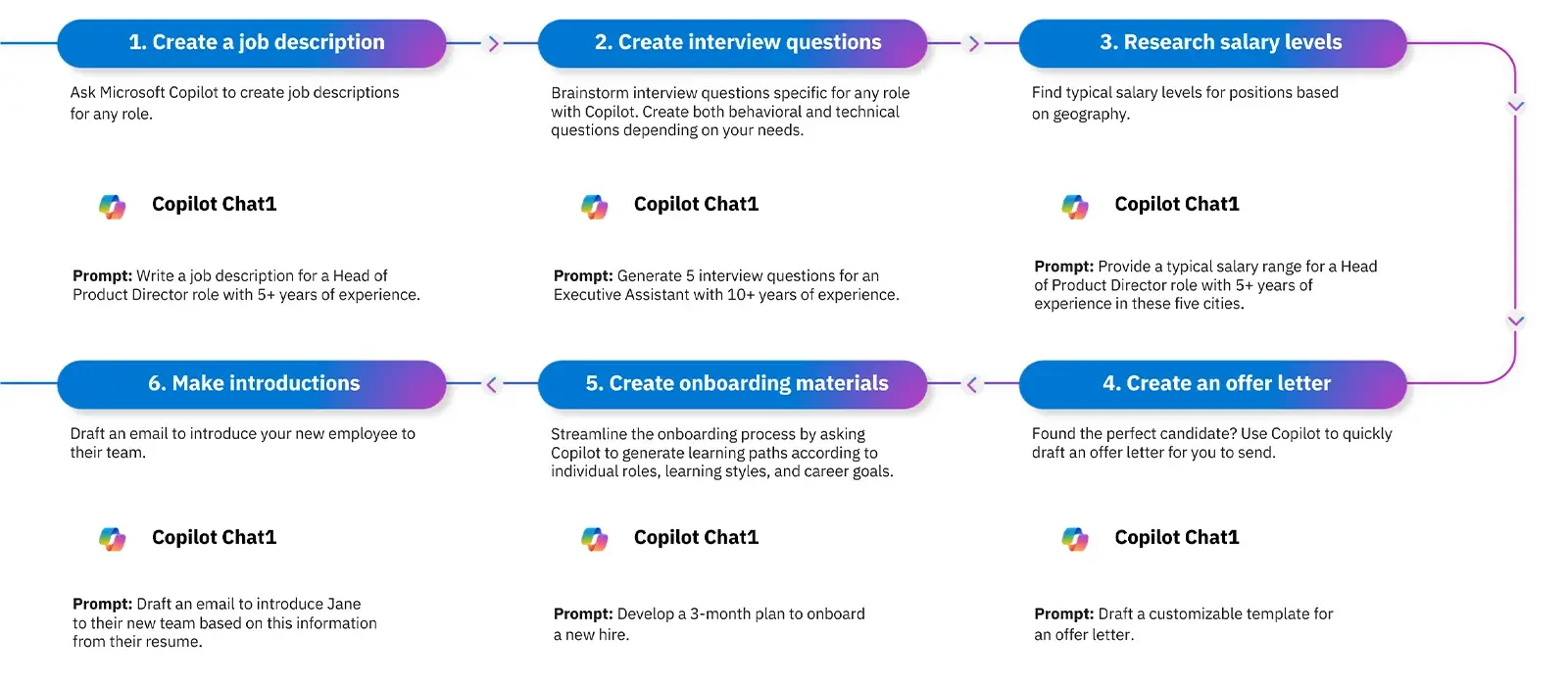Artificial intelligence in recruitment and selection
Author: Laurence Glen | Date published: November, 18, 2024, UK | Read est: 5 min read
AI is an expanding, ever-changing tool that seems to be impacting business owners across all industries. The question on everyone’s mind then is - “What can AI offer me specifically?” For businesses in the recruitment sector, the quistions about AI in recruitment has a lot of answers that cover everything from writing interview questions to screening resumes.
What is AI for recruitment?
At first glance, AI in recruitment seem like an odd pair, but let’s dig a little deeper. If we put our technical cap on, we could define AI for recruitment as using artificial intelligence and machine learning to streamline the hiring process. Without the cap, we can simply say that the main benefit of AI in recruitment is - it’s a time saver.
One of the ways AI saves time for the recruitment sector is through automation. AI can automate various tasks by analysing vast amounts of data with a snap of its fingers. This means that your team doesn’t have to waste time combing through CVs to find someone with the right skill set.
Another time-saving tool under AI’s belt is content creation. Recruiters struggling to come up with the wording for interview questions can put all their ideas into AI and get a cohesive set of questions. By saving time, recruiters focus on the important stuff like contacting the best candidates. It’s a win-win for both recruiters and job seekers.
How Is AI being used in recruiting?
Nothing stretches the work day more than a repetitive task. Luckily for your team, repetitive tasks are AI’s bread and butter. Candidate sourcing and resume screening now take minutes instead of hours, all while offering data-driven insights for better decision-making.
AI tools lead to quicker hiring processes, reduced costs, and higher-quality hires. It can also assist in creating more inclusive recruitment practices by minimising unconscious bias and promoting diversity.
1. Writing job descriptions
Putting pen to paper, or in most cases, fingers to keyboard can be a difficult task. The job description is there, floating around inside your head, but you just can’t get the words out. AI not only helps you word those questions, but it can create optimised job descriptions by analysing industry trends, keywords, and required skill sets.
These tools can ensure that job postings are clear, engaging, and free from biased language that may deter diverse candidates. Additionally, AI can tailor job descriptions to attract a specific type of talent by identifying what phrases and terms resonate with top applicants in similar roles.
2. Automated candidate sourcing
Ask anyone in recruitment what the most time-consuming task is, and most of them will tell you the same thing - tracking down candidates. AI can automatically source candidates by scanning multiple online platforms, including job boards, social media, and professional networks.
AI uses algorithms to identify individuals who meet specific job requirements even before they apply. This proactive sourcing helps companies build a pool of qualified candidates faster, ensuring that they never miss out on top talent.
3. AI-based resume screening
Close your eyes and imagine this - there’s a stack of CVs on your desk from table to ceiling; you know that the rest of your day will be spent flicking through each one and throwing them into two piles. Qualified and not qualified. With AI in recruitment, this nightmare can stay in your imagination.
AI can automatically screen thousands of resumes by evaluating candidates’ qualifications against job requirements. These systems can rank applicants based on factors such as education, skills, and experience, reducing the time recruiters spend manually sorting through resumes. AI resume screening tools also minimise human bias, ensuring a more objective candidate evaluation process.
4. Writing interview questions
Similar to job descriptions, you might know what questions you want to ask the candidate but can’t quite put them into words. AI can assist in developing relevant interview questions tailored to a specific job role. These tools analyse the job requirements and desired skills, generating questions that assess a candidate's qualifications and fit for the company culture.
Let’s take a look at a quick example. We asked AI to “write an interview question focusing on past experiences in the retail sector”.
The response - Can you describe a time when you had to handle a difficult customer in a retail setting? How did you resolve the situation, and what did you learn from the experience?
5. Onboarding
AI recruitment tools can personalise and automate the onboarding process for new hires. These platforms can provide new employees with customised training schedules, digital paperwork, and introductions to key team members, streamlining their integration into the company. AI can also track the onboarding process, ensuring that new hires complete all necessary steps for a smooth transition.
6. Improving Candidate Security
Handling personal information during recruitment can be sensitive, but AI-powered cybersecurity tools can help reduce risks. AI-driven systems can detect and respond to potential data breaches more efficiently, ensuring that candidates’ personal information is safeguarded throughout the hiring process. These systems can also verify identity and detect fraudulent applications, enhancing the security and integrity of the recruitment process.
Why are AI recruiting tools so valuable?
For candidates, AI recruiting tools help create a smoother experience by making the application process faster and more personalised. AI for recruitment can automatically screen resumes and even give tailored feedback, so applicants don’t feel like they’re lost in a sea of applications.
For recruiters, AI is a time-saver, automating repetitive tasks and speeding up the process of reviewing resumes whilst filtering out any suspicious applications to enhance security. By predicting which candidates are the best fit, AI recruitment tools make hiring more efficient and less stressful for everyone involved.

Maximise recruitment efficiency
We’ve already touched on how AI in recruitment provides tools that dramatically reduce time spent on manual tasks, but let’s look at how this increases efficiency. AI allows your team to focus on higher-level responsibilities, like building relationships with candidates and making strategic decisions. The automation of repetitive tasks speeds up the entire recruitment process, ensuring quicker and more effective hires.
Reduce recruitment costs
By automating tasks, AI reduces the need for additional manpower in the recruitment process, thereby cutting down costs. AI-driven solutions reduce the time it takes to fill a position, which helps minimise the expenses associated with prolonged vacancies, such as lost productivity and additional advertising costs.
Overcome recruitment bias
Tackling our internal bias is a challenge and often, our subconscious may be pulling the strings without us noticing. AI in recruitment can significantly reducing unconscious bias by making objective decisions based on data.
From job descriptions to resume screenings, AI ensures that all candidates are evaluated on their skills and qualifications, not personal characteristics. This helps promote diversity and inclusion within the workplace, leading to a more balanced and fair recruitment process.
Improve the candidate experience
AI improves the candidate experience by providing timely communication, personalised job recommendations, and a smoother application process. Automated chatbots, for example, can answer candidates' questions 24/7, while AI-driven platforms can offer real-time updates on their application status. Email communications can also be automated, ensuring candidates are kept up to date throughout the process, without the need for staff to consistantly write emails by hand. These features ensure that candidates feel informed and valued throughout the hiring process.
Enhance the quality of hires
AI-driven tools can analyse historical data to identify the skills, experience, and traits that contribute to long-term success in a specific role. By matching candidates with these predictive factors, AI enhances the quality of hires, ensuring companies recruit talent that is more likely to succeed and remain with the company.
Microsoft Copilot for recruitment
Microsoft Copilot is an AI tool that essentially acts as a virtual assistant. Copilot for recruitment provides support throughtout the hiring process by automating various stages of from screening to onboarding. Integrated into popular Microsoft tools like Word, Excel, and Teams, Copilot assists with tasks such as writing job descriptions, generating reports, and even analysing candidate data. It can also create templates for interview questions and onboarding processes, reducing the administrative burden on HR professionals.
For example, it can analyse past hires to suggest what type of candidate would be the best fit for an open role. Overall, Microsoft Copilot takes its virtual assistant role seriously and helps streamline recruiting workflows, making the hiring process faster, more accurate, and more efficient.

Laurence Glen
IT Director
Our IT world, together with the ongoing development of this business-critical portfolio of services, is in very capable hands with Laurence at the helm. IBM-trained and with a 22-year track record of proven success in the IT sector ensures Laurence is perfectly placed to lead the overall IT strategy for Focus Group, ensuring we’re at the forefront of product development and service innovations in order to deliver the best possible IT technologies for our customers.